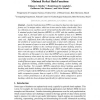Free Online Productivity Tools
i2Speak
i2Symbol
i2OCR
iTex2Img
iWeb2Print
iWeb2Shot
i2Type
iPdf2Split
iPdf2Merge
i2Bopomofo
i2Arabic
i2Style
i2Image
i2PDF
iLatex2Rtf
Sci2ools
110
click to vote
SBBD
2008
2008
Indexing Internal Memory with Minimal Perfect Hash Functions
A perfect hash function (PHF) is an injective function that maps keys from a set S to unique values, which are in turn used to index a hash table. Since no collisions occur, each key can be retrieved from the table with a single probe. A minimal perfect hash function (MPHF) is a PHF with the smallest possible range, that is, the hash table size is exactly the number of keys in S. MPHFs are widely used for memory efficient storage and fast retrieval of items from static sets. Differently from other hashing schemes, MPHFs completely avoid the problem of wasted space and wasted time to deal with collisions. In the past, the amount of space to store an MPHF description was O(log n) bits per key and therefore similar to the overhead of space of other hashing schemes. Recent results on MPHFs by [Botelho et al. 2007] changed this scenario: in their work the space overhead of an MPHF is approximately 2.6 bits per key. The objective of this paper is to show that MPHFs are a good option to index...
Related Content
| Added | 30 Oct 2010 |
| Updated | 30 Oct 2010 |
| Type | Conference |
| Year | 2008 |
| Where | SBBD |
| Authors | Fabiano C. Botelho, Hendrickson R. Langbehn, Guilherme Vale Menezes, Nivio Ziviani |
Comments (0)

